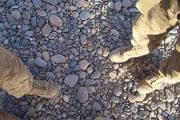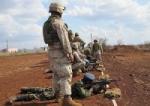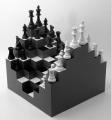After having been relatively quiet about Syria in the past couple of weeks, TD's News Section (6 Feb 2012) has multiple Syria stories, including the lede story, Syrian forces bombard Homs, 50 killed:
I'd expect the overt Russian legal response to be that such sanctions are "economic aggression" - a position taken since the 1930s as to sanctions they do not like.6 February 2012 / REUTERS, BEIRUT
Syrian forces bombarded Homs on Monday, killing 50 people in a sustained assault on several districts of the city which has become a centre of armed opposition to President Bashar al-Assad, the Syrian National Council opposition group said.
"The tally that we have received from various activists in Homs since the shelling started at six this morning is 50, mostly civilians," the group's Catherine al-Talli told Reuters.
"The regime is acting as if it were immune to international intervention and has a free hand to use violence against the people," she said.
The bombardment came a day after the United States promised harsher sanctions against Damascus in response to Russian and Chinese vetoes of a draft UN resolution that would have backed an Arab plan urging Assad to step aside.
...
US Secretary of State Hillary Clinton said the United States would work with other nations to try to tighten "regional and national" sanctions against Assad's government "to dry up the sources of funding and the arms shipments that are keeping the regime's war machine going".
"We will work to expose those who are still funding the regime and sending it weapons that are used against defenseless Syrians, including women and children," she said. "We will work with the friends of a democratic Syria around the world to support the opposition's peaceful political plans for change."
Clinton did not say which nations might band together or precisely what they might do. But it appeared that the United States might seek to help organise a "Friends of Syria" group - proposed by French President Nicolas Sarkozy after the veto - to advance the Arab League initiative given the inability to make headway at the U.N. because of Russian and Chinese opposition.
OIC voices deep regret over no UN agreement on Syria:
Organization of Islamic Cooperation - Wiki.5 February 2012 / TODAY'S ZAMAN, İSTANBUL
The General Secretariat of the Organization of Islamic Cooperation (OIC) has expressed deep regret over the failure of the UN Security Council to reach an agreement on a draft resolution on Syria which called for the settlement of the current crisis in Syria and the immediate cessation of all acts of violence.
The organization in a statement on Sunday expressed the hope that the inability of the Security Council to adopt the resolution on the Syrian crisis will not result in more deaths in Syria.
The General Secretariat renewed its call on all Syrian parties to save the country from the risk of sliding into civil war, a situation that threatens peace, security and stability in Syria and the region as a whole.
The General Secretariat condemned the ongoing violence, which led to the deaths of large numbers of innocent victims in the city of Homs, and called on the Syrian government to focus on a political solution as the best way to resolve the Syrian crisis. It also called on the government to work to institute the reforms it promised to fulfill the hopes and aspirations of the Syrian people towards reform and change.
Chief army defector promises fight to free Syria:
BL: The "Western countries" are nowhere near armed intervention.5 February 2012 / AP, BEIRUT
The commander of rebel Syrian soldiers said Sunday there is no choice but to use military force to drive President Bashar Assad's regime from power as fears mounted that government troops will escalate their deadly crackdown on dissent after Russia and China vetoed a UN resolution aimed at resolving the crisis.
...
"There is no other road" except military action to topple Assad after the vetoes at the UN, the commander of the Free Syrian Army told The Associated Press by telephone from Turkey.
"We consider that Syria is occupied by a criminal gang and we must liberate the country from this gang," Col. Riad al-Asaad said. "This regime does not understand the language of politics, it only understands the language of force."
...
A deeply sensitive question is whether such a coalition would back the Free Syrian Army. There appears to be deep hesitation among Western countries, fearing a further militarization of the conflict.
In an interview with Al-Arabiya TV on Saturday after the U.N., the head of the Syrian National Council Burhan Ghalioun said a coalition might give the FSA support "if necessary" to "protect the Syrian people."
Turkey warns Assad to not misread failed resolution at the UN:
These statements simply restate the Turkish position held over the past few months.5 February 2012 / TODAY'S ZAMAN WITH WIRES, ANKARA
Turkey warned the Syrian regime against misreading the will of international community after the UN Security Council failed to adopt a strong resolution following a veto by Russia and China.
“The rejection of this resolution must never constitute a pretext for the Syrian administration to add new mistakes to the existing ones,” a statement issued by the Foreign Ministry said on Saturday. ...
Speaking to a group of reporters on the sidelines of the 48th Munich Security Conference in Germany over the weekend, Turkish Foreign Minister Ahmet Davutoğlu stated that Turkey will not sit idly by in the face of killings perpetrated against civilian protestors in its southern neighbor. He did not specify, however, what steps Ankara is considering against Syria at this juncture.
Delivering a speech at conference, Davutoğlu said Turkey, as a neighboring country, had a moral responsibility for the protection of Syrian people. If needed, Turkey could host Syrian people wanting to escape the violence, he said, adding that this could be a powerful signal to the Assad administration. He dismissed claims that Turkey held talks under a NATO banner for a military intervention in Syria as baseless. Commenting on Iran, Davutoğlu said that a military intervention in Iran would be disaster for the region and urged negotiations instead.
...
Deputy Prime Minister Bülent Arınç slammed Iran on Sunday, saying that if Tehran keeps silent in face of the atrocities committed in Homs, it should take out the word “Islam” from the official name. “We know there is a country called the ‘Islamic Republic of Iran.' It is not a republic of a certain sect. Intentionally killing Muslims on such a [Holy] day is not something that can be disregarded,” he said in Bursa province. Arınç also claimed that the number of causalities in Homs has reached 500.
Deputy Prime Minister Bekir Bozdağ also warned that the Syrian crisis should not be treated as political rivalry among competing global powers. “Countries should view Syria from a humanitarian perspective. If they continue to see it from a political rivalry persective, the Syrian regime will keep killing its own people,” he said in The Hague.
Justice and Development Party (AK Party) Manisa deputy Naci Bostancı, who is also deputy chairman of the Human Rights Commission in the Turkish Parliament, told Today's Zaman that the Assad regime continues to misread the demands of its own people as well as calls from international stakeholders. “The regime will see this failed resolution as support for its actions,” he warned, adding that the fate of Assad was sealed no matter how hard he tries to cling onto power. ...
From the same article, we learn that Syria has learned some "Lawfare" art:
Syrian UN envoy Bashar Ja'afari denied that Syrian forces killed hundreds of civilians in Homs, saying that "no sensible person" would launch such an attack the night before the Security Council was set to discuss his country. Syrian Information Minister Adnan Mahmud accused Syrian rebels of shelling Homs to "to swing the vote" at the Security Council. "The reports on some satellite channels that the Syrian army shelled neighborhoods in Homs are fabricated and unfounded," Mr. Mahmud said in a statement to AFP. The online news media firatnews.com, a mouthpiece for the terrorist Kurdistan Workers Party (PKK), which stages attacks against Turkey, hailed the veto decision of Russian and China and reported on what Mr. Mahmud had said with regard to Homs.and that limited fallout occurs on the Turkish side of the border.There were reports that the Syrian army had engaged in a gun battle with the opposition forces nearby Turkish border village of Guvecci overlooking Syria. The Cihan News Agency filed a story on Sunday from Hatay province that villagers in Guvecci reported gun fire on Saturday night. A few bullets hit a solar panel on the roof of a house in the village and authorities urged residents to stay indoors.
cont. in part 2.





 ), the question is whether the closer analogy here is 1954 Guatamala or 1961 Bay of Pigs.
), the question is whether the closer analogy here is 1954 Guatamala or 1961 Bay of Pigs.






Bookmarks